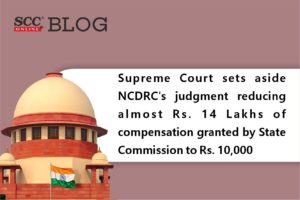Supreme Court: In an appeal filed against the judgment passed by the National Consumer Disputes Redressal Commission (‘NCDRC’), wherein the amount of compensation has reduced to Rs. 10,000/- as against the amount of Rs. 13,79,901/- granted by the State Commission to be paid to the appellant, division bench of B.R. Gavai and B.V. Nagarathna* held that NCDRC was not right in setting aside the judgment passed by the State Commission and therefore, set aside the same. Further, as the respondents were severally and jointly liable, the Court directed them to make the payment of the said amount within a period of two months from the date of this judgment.
The issue in this case was whether the National Commission was justified in reversing the judgment passed by the State Commission, thereby reducing the amount of compensation that the appellant was entitled to?
In the case at hand, it was alleged that the respondents acted in collusion with each other and have got the goods cleared based on the Forwarder Cargo Receipt (‘FCR’) itself, without paying the sale consideration to the appellant.
The Court noted that the State Commission had awarded compensation of Rs. 13,79,901/- towards loss suffered by the appellant plus Rs. 50,000/- towards compensation for mental agony and harassment plus Rs. 10,000/- towards cost of litigation. The NCDRC, on the other hand, reduced the compensation to Rs. 10,000/- along with an interest at the rate of 9% per annum from the date of filing the complaint till the date of payment.
The Court said that in this case, the sale of goods was through a Free on Board (‘FOB’) contract, wherein the buyer must name the ship upon which the goods are to be delivered and the seller must put them safely on board and meet the cost of doing so. Here the contractual liability of the seller as a seller ceases and the goods are then at the risk of the buyer, he is responsible for the freight. Further, under the ‘FOB’ contract the seller is under no duty to make advance arrangements for shipping the goods or to bear any expense beyond that of putting the goods on board. That while putting the goods on board the seller is directly a party to the contract of carriage and he may be bound to get the bill of lading issued in buyer’s name on the terms usual in the trade. The bill of lading is an instrument signed by the master of shipping in his capacity of the carrier acknowledging the receipt of the merchant goods.
The Court said that the appellant availed services provided by the respondents, therefore the appellant would fall under the definition of a ‘consumer’ as is under Section 2(1)(d)(ii) of the Consumer Protection Act, 1986. (‘Act of 1986’)
The Court referred to Section 2(g) of the Act of 1986, wherein ‘deficiency’ is defined, and noted that the appellant through a letter gave shipping instructions to respondents, wherein it was mentioned that the shipment is from FOB, New Delhi to Baltimore. However, despite clear instructions vide the said letter, respondents negligently recorded the port of loading to be JNPT Bombay. Thus, it is due to this negligence as well as deficiency in service of the respondents that the bank refused to honour the documents including the FCR and the same was returned to the bank of the appellant, due to which, the sale consideration was not paid to the appellant, who suffered loss as well as mental harassment and agony.
The National Commission in the impugned order has held that it is an admitted position that a mistake was committed by the respondent while issuing the FCR to the appellant, and the State Commission has based its decision on the said reasoning.
The Court said that when it is admitted that a mistake was committed by the respondent, it is not correct to say that the said mistake was not noticed by the appellant while forwarding the documents to its bank and that the appellant should have been more vigilant, but it would be incorrect to now say that the appellant should have exercised due diligence in that regard.
The Court observed that NCDRC has categorically held that there was deficiency in rendering services by the respondent, therefore, the National Commission ought not have reduced the compensation payable to the appellant herein.
[Bawa Paulins (P) Ltd. v. UPS Freight Services (India) (P) Ltd., 2022 SCC OnLine SC 1551 decided on 10-11-2022]
*Judgment by: Justice B.V. Nagarathna.
*Apoorva Goel, Editorial Assistant has reported this brief.

